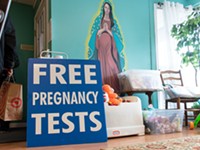Feedback 7/30
[
{
"name": "500x250 Ad",
"insertPoint": "5",
"component": "15667920",
"parentWrapperClass": "",
"requiredCountToDisplay": "1"
}
]
We welcome your comments. Send them to [email protected], or post them on our website, rochestercitynewspaper.com, our Facebook page, or our Twitter feed, @roccitynews. For our print edition, we select comments from all three sources; those of fewer than 350 words have a greater chance of being published, and we do edit selections for publication in print. We don't publish comments sent to other media.
The city's riots, 50 years later
In recent weeks, there has been a great deal of effort to remember our collective history and the racial uprising of July 1964. This effort is incredibly important, as the history of people's movements demanding and winning change is essential to this day.
The history of FIGHT taking on one of the largest and most powerful corporations of its day to demand racial and economic justice is an incredible social-justice victory in the history of this city.
What I find saddening, however, is that there seems to be a collective amnesia about the history of many in the white community who actively organized to support the demands of FIGHT, forming the organization Friends of FIGHT.
What is particularly alarming about this collective amnesia is that Friends of FIGHT continues to exist, as Metro Justice, a multi-racial community organization dedicated to social, economic, and racial justice. There seems to be a convenience in forgetting about Metro Justice, an organization of 900 members that continues to be a thorn in the side of current power players demanding genuine justice through people's movements.
Our seven-point program for economic justice calls for justice in the fields of health care, education, and jobs. We have recognized for 49 years the continued need for movements of everyday people to demand genuine justice in these fields. We continue to fight for genuine universal health care in New York State. We are working towards equitable education funding and restorative justice in our schools to end the school-to-prison pipeline. We are part of the nationwide Fight for 15, demanding a living wage and a union for fast-food workers in the city.
The multi-racial community fight for social, economic, and racial justice continues in Rochester, in part through Metro Justice, whose members vividly remember our history as Friends of FIGHT.
COLIN O'MALLEY
O'Malley is organizing director of Metro Justice.
Rochester, the city that embraced Frederick Douglass, was long known for its tolerance of African-Americans. So says the great baritone, 1950's Broadway star, and actor William Warfield in his autobiography "My Music and My Life."
Warfield was born in Arkansas but grew up in Rochester, where his father was minister at Mt. Vernon Baptist Church. He wrote about being "safely in Rochester" as lynchings were still commonplace in the South: "From our safe vantage in Rochester... there was often the sense that all these terrible things were happening in a foreign land. By contrast, we were safe in our melting pot, surrounded by a vigorous tradition of tolerance."
Could decades and decades of tolerance have changed by July of 1964? What changed was the influx of thousands of blacks during the mass migration from the South after World War II. Rochester's resources and social services were overwhelmed. Frustration in the black community spilled out into the streets. Blocks and blocks of stores were looted and burned. Parts of the city resembled a war zone. In fact, armed troops had to be called out to restore order.
The riots tore at the fabric of the city, and fear among whites was real. Forced busing in the years that followed accelerated the flight to the suburbs, and resulted in a city even more segregated. And a half-century later, this city has not fully recovered.
There has been an attempt by some to rewrite history, to almost forgive the lawlessness of the rioters. If similar riots were to happen today, with armed soldiers called in by the governor to quell the violence and restore peace, would we regard the lawbreakers as victims?
I hope not.
RAY LEVATO
Levato is a retired WHEC newscaster.
I live in the suburbs but I used to live in an apartment in the city. We eventually were able to buy a home in a modest suburb because we wanted more space and a yard. After many years, we're close to paying off the mortgage. So it bothers me that one of the solutions suggested for the problem of poverty is to build low-cost subsidized housing in the suburbs ("Riots Still Haunt Rochester," News).
Really? How does it help the problem of poverty by spreading it out around the county? It doesn't address the problem at all. And if transportation to jobs is also a problem for the poor, doesn't it make that harder if they're dispersed? Does that mean they will need access to low-cost cars in addition to housing?
The other problem is the burden on suburban schools with the influx of people. We'll have to pay for that, too, I suppose. If we help low-income people move to towns adjacent to the city, can I get help to move to a more affluent suburb like Pittsford or Mendon?
FUMING
Racism does exist, but it exists as much on the blacks part as whites. When I go into parts of the city like Genesee-Jefferson, Jay-Orchard, and Lyell Avenue, I lock the doors and try to not get stopped at lights, even if it means running red ones.
It's not because I'm paranoid, it's because the people there view me with suspicion and hostility. I'm not one of "them" because of the color of my skin and never will be.
Jay-Orchard is ranked in the top 10 most violent neighborhoods in the nation. We can either pretend that the problems are all external and not their fault, or they can do what they should and take responsibility.
If I don't want to go through Lyell or Conkey Avenue, there's a reason. I don't want to be the victim of essentially an urban terrorist attack. I shouldn't have to. I can go through any neighborhood in Chili, Brighton, Pittsford, Penfield, or Fairport without a problem.
SEAN
And on education...
I understand Mark Hare's frustration with the city school system and its failing students ("Lessons for Rochester from Raleigh"). What Raleigh seems to have done is create an environment that changes the mathematical distribution of families by creating magnet schools; thus scores and the number of graduates improve.
That would be expected. But it does not solve the underlying problem; it only dissolves it a bit. If we don't develop a plan to educate both child and parent from the poor neighborhoods, those who are poorly educated will continue to exist.
It is the lack of respect for education in our city homes that creates an environment for failure. If a parent failed in school and has no use for that facility, you can't get the kid there. If a parent can't read, he or she can't help a kid to learn to read; if they can't do math, they can't help their child do math. If parents never developed a good value system and ethics, they can't teach and re-enforce a good attitude in their kids.
I have to laugh at the state, district, and University of Rochester solution to the East High problem. They are attacking an aspect of the facility, the teaching faculty, which will not improve the student outcome. Not one parent of a failing student will be affected by this new approach, and thus the real problem related to the failure of students at East will not be solved.
Lastly, more money in the wrong place also solves no problems. A beautiful, well-equipped facility with a teaching staff with a list of suffixes after their names cannot fix a problem that they have no contact with: parents.
Not sure what you really learned in Raleigh, but until we figure out how to change the culture of the city family, nothing can be accomplished in the classroom.
BILL BROWN
Rochester riots | 1964 riots | Rochester poverty






